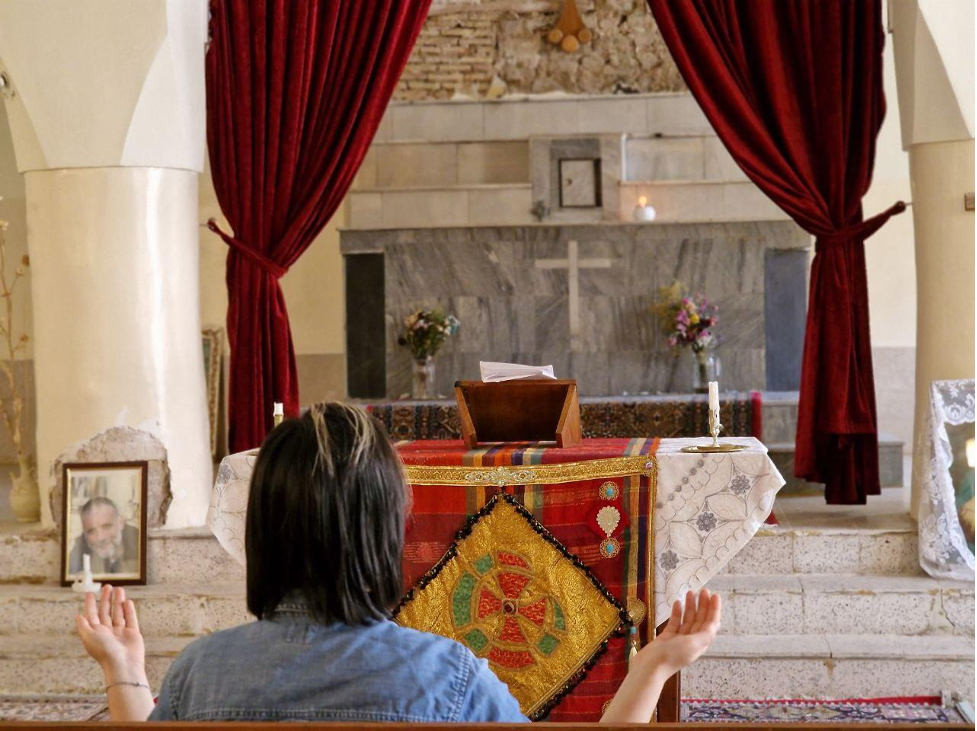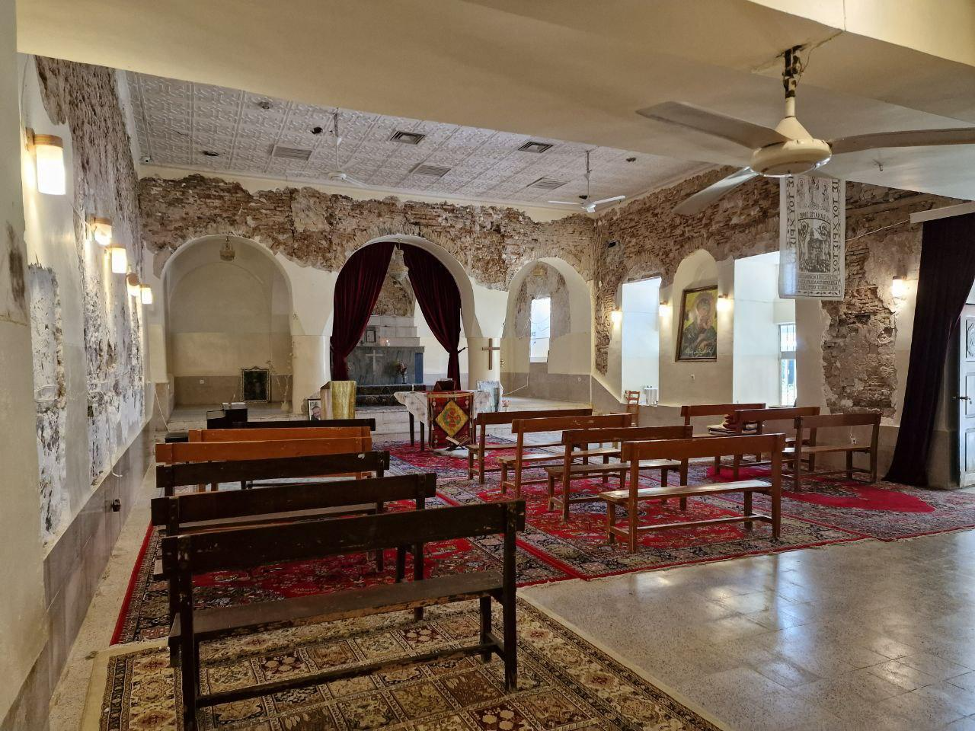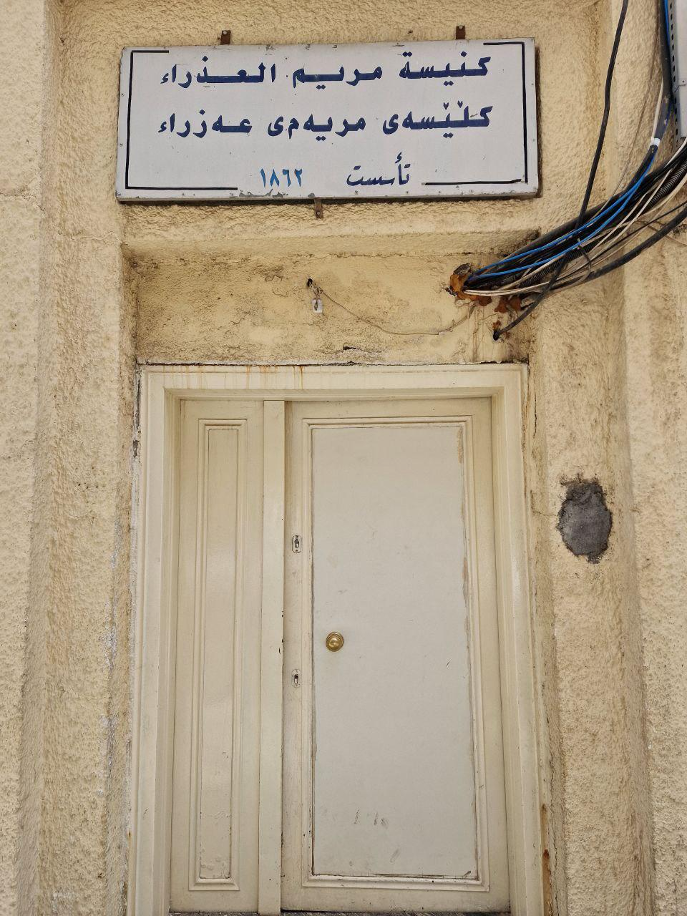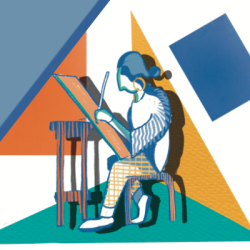Exploring Artistic Horizons: TPH's Inaugural Digital Art Session
Maryam Al-Adhra: a Christian Parish Promoting Coexistence, Education Run By Muslims in Iraqi Kurdistan
By: Dunya Soran and Kakalaw Abdulla
Finding the oldest monastery in Sulaymaniyah, the second largest city in Iraqi Kurdistan can become quite exhausting because it is located in the heart of the city amidst intricate and narrow alleys in the historic Sabunkaran neighborhood. But upon arrival at the destination, it becomes evident that the remarkable Deir Maryam al-Adhra (Virgin Mary) monastery captures attention with its captivating allure and renovated appearance. The presence of a prominent large cross reaffirms your certainty that you have indeed reached the right place.
Entering the building is quite something else; there are children, teenagers, and young people involved in different activities. It is a church not like any other in a city where its majority are Muslims. Deir Maryam Al-Adhra holds events, conferences, and educational activities for all different ages with all religions and denominations: Christian, Muslim, and Yazidi without any religious discrimination.
“There is something important here: no one talks about religion and there are no religious discriminations whatsoever,” said Marwa Nuri, a student who participates in an English course at the church.
Marwa, 30, is a Muslim who has been going to the monastery for over a year now, expressing her joy about her time spent at the Deir Maryam al-Adhra while reiterating that “no one in the church’s administration likes to talk about religion because there are people who come from different backgrounds and they don’t want them to think that they are somehow being lured to convert to Christianity.”
This is one of the main missions of the monastery following 2012 when it became a monastery church for the Al-Khalil community which is a community promoting closer relations between Christians and Muslims.
The monastery was almost abandoned before that and it was right after that year when peace and coexistence initiatives emerged following its integration to the Al-Khalil community, founded by the Italian Jesuit Paolo Dall’Oglio in 1991 in Syria.
“Here we have organizational activities and we launch initiatives, mainly in education, focusing on teaching English, Arabic, and Kurdish languages so that we can facilitate communication between Arabs, Kurds, and other ethnicities with different religions,” said Nejah Ahmed Emam, assistant to Father Jens, the minister of the monastery.
Emam who is also the head of the Al-Khalil project and a Muslim, explained that the idea became concrete and effectively took shape after 2014, when ISIS took over large swathes of land in Iraq and Syria.
“When ISIS came, so many refugees from Iraq and Syria fled to cities in the Kurdistan region and some of them came here to Sulaymaniyah. So, we thought that to ease communication between them, we launch language courses and the other goal was creating an understanding and coexistence between Christians and others from other religions, namely Islam,” she added.
Most of them that sought refuge in the church were Chaldean Christians and from 2014 to 2017, the church managed to support and offer hospitality to more than 250 Christians divided into more than 50 families.
Many of them now either sought asylum abroad, returned home, or went to other parts of the Kurdistan region while a small portion remained in Sulaymaniyah.
According to the church’s data, nearly two to three thousand Christians live in the city now which is a small portion of the whole population spread across the region numbered at around 300 hundred thousand.
Most of the Christian community in Iraq now live in the region as they feel safer compared to cities in Iraq. The community in Iraq is divided into fourteen sects with Chaldean being the majority by more than eighty percent.
According to the US State Department's annual report about freedom of religion in Iraq, minorities, including Christians, have more freedom of religion in the Kurdistan region than they have in Iraq.

Diana Khalid, who is a 17-year-old Christian working in the church, said that she and her family came to Sulaymaniyah in 2014 and they felt safe and secure.
“After 2014 we relocated to Ankawa in Erbil… And then came to Sulaymaniyah, we felt safe and have no problem regarding our religion. the people in Sulaymaniyah respect minorities and they treat us normally,” said Diana.
Abdelmassih Yousef, another Christian who has been working as a communication officer in the church for almost 30 years, reiterated that they saw no religious discrimination but sometimes the government created obstacles to their activities.
“The people of Sulaymaniyah are very kind and mindful about religions and they don’t discriminate but the governorate interferes in our works and they say that we have to bring confirmation from security forces and education ministry when holding even a small event or a course for people, especially refugees and displaced people,” Yousef Added.
The monastery encompasses a variety of structures and facilities, blending both ancient and contemporary elements, all interconnected by a cloister and passageway within three floors. It has a big prayer room, an adult library containing more than 500 hundred books, a library for children, classrooms, and office rooms for employees.

“We gather in the praying room to do our praying on Fridays and also on Sundays but the number is close to seven to ten people but on ceremonial days, more people come here to pray,” said Khdir Yaqoob, a receptionist in the church.
The church was built in 1862 when the Christian population grew gradually in Sulaymaniyah to more than one hundred families. It was built by Christian philanthropists headed by Al-Shamas Yalda, a Christian businessman originally from Sanandaj, Iran. He was the father-in-law of Karim Alaka, a well-known public figure and also a businessman in Sulaymaniyah back then.

The preservation and upkeep of this living heritage, as well as the implementation of various initiatives and endeavors, are supported by numerous civil society and religious organizations from Iraq and Europe.
Emam explained that with the help of international and local organizations, they had managed to link their English courses to the Cambridge English Test after students had completed their three levels of English language in the church. She also mentioned that they had an association with universities within Jesuit Worldwide Learning, a Catholic society that owns numerous universities around the world.
Students in the church who become participants in this worldwide learning have the opportunity to study six different topics of their choice, namely graphic design, creative writing, social work, eco-tourism, and peace leadership. They also get certificates at the end of each training as if “they were abroad studying a short course,” Emam added.
The monastery used to have a school but is now closed due to financial reasons. In the library, students could attend reading sessions weekly and then have their opinion on the specific book being read “so that they can participate in a healthy discussion aimed at promoting coexistence and peace,” said Emam.
What is striking is that Father Jens would not preach Christianity in his church and even if someone wanted to convert to Christianity, he would challenge the person not to do so.
“I am a Muslim and no one has ever tried to convince me to convert to Christianity,” Emam said. “Father Jens discourages those people who come and want to convert. He says to them: ‘Why do you want to convert when you have a good religion of your own which is one of the Abrahamic religions?’ he debates with them and only if he’s convinced that the person truly studied Christianity, he’s willing to help and point to another church for them to convert,” She explained.
Just before Emam explained all this, Abdelmassih jokingly said, “Only me and Father Jens are Christians in this church”, pointing to the fact that most of the employees in the Deir Maryam Al-Adhra – numbering between 30 to 40 people – are Muslims peacefully going about their business in the historic church.
